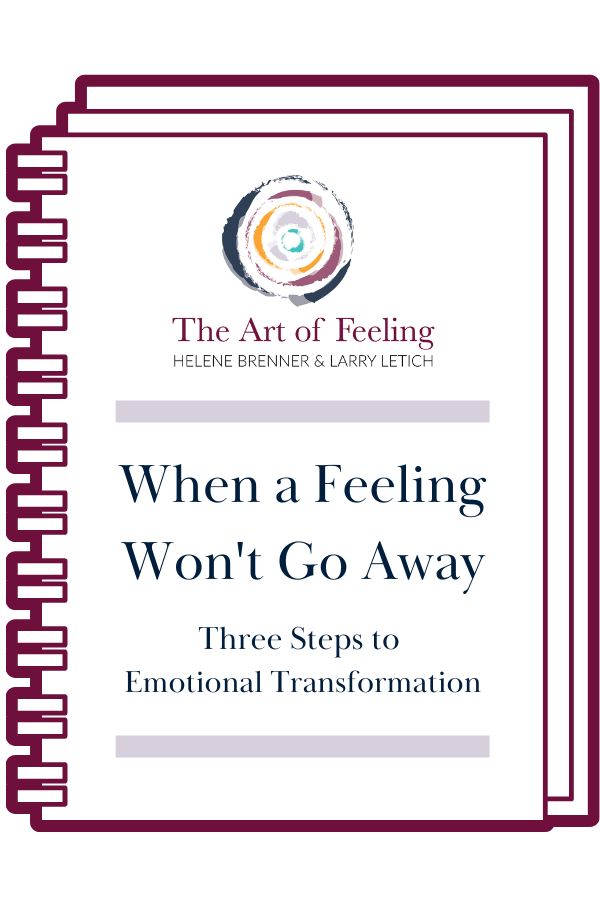What’s with men and emotions?
A lot of women say that the man, or men, in their life never share what they feel. They “bottle up” what they feel. Or they don’t know what they feel. Or even that they have no feelings.
A lot of men would agree. Men often say that they don’t know what they feel. But truthfully, even when we do know what we feel, the simple act of talking about what’s going on emotionally inside feels incredibly risky. And for many of us, what’s going on in there seems set to only two volumes: either so low we can barely hear it, or so intensely loud and compelling we don’t know how to handle it.
No matter what your gender, there are many reasons a person can have trouble being connected to their emotions. But men carry additional burdens when it comes to emotional awareness, connection and intimacy, due to the invisible emotional straitjacket imposed by what I like to call “the Male Code.”
What is the Male Code? It’s an unspoken agreement that you should do anything in your power not to feel pain, fear, weakness, or vulnerability. It includes as well the unspoken, and often unconscious, belief that the emotions of anger, aggression and sexual desire, while more acceptable, are overpowering. As a result, allowing yourself to feel or even acknowledge most of your feelings is either weak or dangerous, something you should try to do as little as possible.
An Evolutionary Adaptation
People talk nowadays about “masculinity” as if it has only negative traits, but hey, there’s at least one aspect of the Male Code that’s powerfully life-giving and life-supporting. It includes an innate drive to be strong, fearless and yes, callous enough to do whatever it takes to protect those you love from any external threat, at whatever cost to yourself.
There’s even a valid (and surprising) evolutionary reason why men are generally less sensitive to physical pain, and more conditioned to deny physical pain, than women. When it comes to survival of the species, we males are more expendable. You can lose a lot of males and the population can keep growing. But lose too many females, especially females with offspring, and a species can head to extinction.
When baboon troops cross the savannah, they move in close groups, with the fully grown but young males—the ones who haven’t yet mated—on the periphery to fend off predators, often sacrificing themselves in the process. Sound familiar?
And have you ever wondered why men seem to be “assigned” to do the “dirty” jobs, like taking out the garbage? Or why most boys have no problem touching bugs and rodents while most girls get creeped out by them? Pathogens. Before antibiotics and vaccines, infections and infectious diseases killed more people by far than anything else. Women who hated, feared and avoided things that might carry pathogens were more likely to live long enough to raise their children to adulthood, and passed on their genes to their daughters.
The Consequences of Our Emotional Callousness
But while the Male Code may have evolved for good reasons, it comes at a heavy cost. No matter where you grew up or how “gender-neutral” your parents were, if you’re a guy, you were socialized to believe it’s a sign of weakness and unmanliness to even feel sadness or fear, much less express it out loud.
Admit it: Deep down you still at least half-believe it.
Back when we were barely eight or nine years old, we men started deliberately cultivating emotional calluses in order to bear more pain, both physical and emotional, without showing it or being stopped by it. Or if, like me, you were one of those boys who because of your temperament couldn’t pull that off, you probably felt ashamed of your “failure.” Because for boys, even looking as though you might be afraid—or worse, cry—feels like an invitation to be ridiculed and ostracized by your friends and attacked by aggressors ready to exploit your defenselessness.
Even if you didn’t get this message at home, you definitely got it from other boys. I’m sure boys still do.
So with this kind of cultural upbringing, is it any surprise that even the most sophisticated heterosexual hipster guy enters adulthood convinced that acting any way other than calm, cool and “strong” is about as attractive to the opposite sex as a dirty diaper? Anything else feels like a failure to be a “real” man.
And he may be right. Our culture is very confused right now about how men are “supposed” to be. For countless millennia, men had to be bigger, stronger, and physically tougher than women to do the hard physical tasks that kept their families sheltered and fed. And they had to be able and willing to fend off predators, both animal and human. Provide and protect. That’s what men did. Simple.
But what now? What is our role when most of us are no longer the sole, and may not even be the primary, provider? And when, unless you go into the military or become a police officer, the closest you’ll ever get to being a “protector” is playing Call of Duty?
Fast-forward a few years. The man is now in a committed long-term relationship. One day, a tragedy or major setback befalls the two of them. A death. A lost job. He may then feel that he must be “strong,” even that his partner needs him to be strong. Failing to keep up that facade with his partner can lead to feelings of intense shame and fear of rejection, feelings that intensify the desire to hide what’s really going on inside him.
What about anger? Don’t men, as the cliche goes, “channel all their feelings into anger”? Some men do. But actually most of us “modern” men are afraid of our feelings of anger and aggression, and for good reason. Men are wired to have strong feelings of anger and aggression, but in the modern world, unless you’re a linebacker or trial lawyer, actually getting aggressive or angry is almost always a losing strategy, at home, in the workplace, and on the street.
Sex and Emotions: The Gender Divide
No wonder that for most men, the only way we feel we can be emotionally intimate is through physical intimacy—through sex. It’s the only way we know to reach that feeling of being fully open and unguarded with another person.
The trouble is, many if not most women want to feel emotionally intimate before they have sex. That may be the one thing that makes them want to have sex in the first place! They also may want to feel that they can have emotional intimacy with their partner for its own sake, without it having to lead to sex.
It makes perfect sense that a woman would turn to the man she loves and innocently ask him to share his feelings. But when she does, what often happens is that he finds that the language to describe his emotions feels foreign to him, and the internal signals indicating them are faint and crackling. Alarm bells go off inside him. What if he doesn’t do this right? What if he tells her the “wrong” feelings?
What, then, do many men feel when their wife or girlfriend invites them to open up? Stupid. And one-down. Not emotionally safe.
Sometimes, however, it can go in a different direction. Some men feel safe enough to share their feelings with their partner. But if they still believe in the Male Code, they see their emotions, and the sharing of them, as a sign of weakness, not strength. They won’t fully open up, and if they do they’ll feel bad about it later. They won’t share their feelings with anyone else, especially other men. And they won’t get outside help if they need it. This doesn’t lead to the emotional awareness men need—or the emotional connection women want.
Updating the Male Code
While there are sound physiological and cultural reasons for men to feel differently than women—to cry less, for example, and feel less physical pain—we men are every bit as capable of emotional awareness as women.
Fortunately the cultural rules against men feeling and knowing their emotions are beginning to break down. There’s no reason for them anymore. They no longer serve a purpose. In the 21st century, the ability to experience, understand and express our emotions authentically to strengthen our relationships and gain support is a skill we men need—and a strength we can develop, just as we can build more powerful biceps and delts.
It’s great to build emotional awareness through a relationship with a romantic partner. In fact, that’s what lots of men do. But I’ve found that it can be just as, if not more effective to develop emotional awareness and strength with a group of other men.
EVRYMAN (evryman.com) is an organization started five years ago by six men for the purpose of helping men connect emotionally to themselves, other men and the people they love through in-person and online men’s groups. While COVID may have slowed it down, since then, it has grown to include tens of thousands of men on four continents. While EVRYMAN attracts men from every race, class, education level, sexual orientation and age from 20s to 70s, the greatest number are heterosexual millennials. It’s living proof that there’s no contradiction between masculinity and having emotions.
The old Male Code, for all its faults, helped the human race survive until the mid-20th century. But the challenges of the 21st century call for something different. We can keep the old imperatives to protect and provide and add some new ones. To connect. To show up. To let our true selves shine. It’s time for a new, improved Male Code.


 We’re Helene Brenner and Larry Letich. Helene is a licensed psychologist in private practice for more than 30 years. Larry is an individual and couples therapist. Besides being therapists, we’re co-authors and partners in life and love for more than four decades.
We’re Helene Brenner and Larry Letich. Helene is a licensed psychologist in private practice for more than 30 years. Larry is an individual and couples therapist. Besides being therapists, we’re co-authors and partners in life and love for more than four decades. 

Actually, I believe men have an easier time with intimacy WITH OTHER MEN than with woman.
The issue is not with the men, it is with Woman’s expectations of men.
Most woman will cease to trust and respect a man that shows any emotional weakness or vulnerability.
Men have learned this lesson well and even have a name for weak men A WUSS.
They may say they want a sensitive man but what they actually want is a man who is sensitive to THEM.